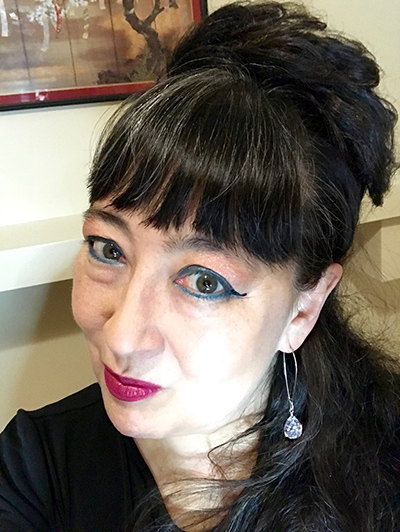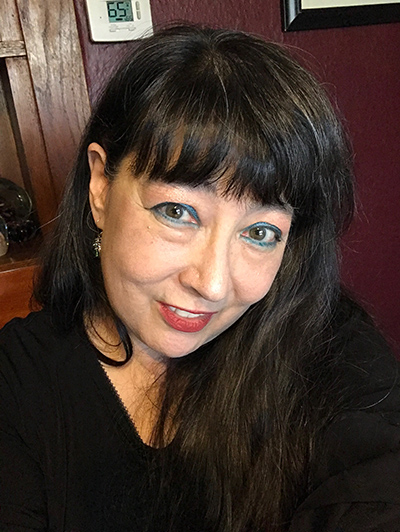
Lee Horikoshi Roripaugh
- Fiction, Creative Nonfiction, and Poetry Mentor
- Former South Dakota Poet Laureate
- MFA in Writing
Additional Information
Biography
LEE HORIKOSHI RORIPAUGH's fifth volume of poetry, tsunami vs. the fukushima 50 (Milkweed Editions, 2019), was named a “Best Book of 2019” by the New York Public Library, selected as a poetry Finalist in the 2020 Lambda Literary Awards, cited as a Society of Midland Authors 2020 Honoree in Poetry, and was named one of the “50 Must-Read Poetry Collections in 2019” by Book Riot. She is the author of four other volumes of poetry: Dandarians (Milkweed, Editions, 2014), On the Cusp of a Dangerous Year (Southern Illinois University Press, 2009), Year of the Snake (Southern Illinois University Press, 2004), and Beyond Heart Mountain (Penguin, 1999). She was named winner of the Association of Asian American Studies Book Award in Poetry/Prose for 2004, and a 1998 winner of the National Poetry Series. The South Dakota State Poet Laureate from 2015-2019, Roripaugh is a Professor of English at the University of South Dakota, where she serves as Director of Creative Writing and Editor-in-Chief of South Dakota Review. Roripaugh served as one of the jurors for the 2021 Pulitzer Prize in Poetry, and has been appointed as the Mary Rogers Field and Marion Field-McKenna Distinguished Professor of Creative Writing at DePauw University for Spring 2022.
Teaching Philosophy
“The creative writing teacher cannot ‘teach’ her students to be writers. Rather, I attempt to aid and abet my students in thinking about, exploring, experimenting with, and working through the creative process. In doing so, I assume the multiple guises of mentor, guide, professional advisor, sympathetic reader, audience at large, critic, and collaborator. My goal is for students to become better writers, and it is ostensibly this same goal that leads student writers, either intuitively or deliberately, into the creative writing classroom—to seek out audience, guidance, and feedback. Along these lines, I strive to be generous with my own creative energy—offering students serious and careful consideration of their work, administering professional/career advice and encouragement, and taking the time to enter into a process of artistic collaboration with each individual student. Ultimately, it is never my goal to impose my own aesthetic sensibilities and tastes upon the student, but rather to be flexible and versatile enough to approach each piece of work on its own terms.
“Another important goal is for students to become better readers—engaged, diverse, and sensitive readers who read not only for pleasure and scholarship, but are capable of reading with a ‘writerly’ eye. I want students to constantly explore a wide panoply of creative possibilities found within a diverse array of literary models. I feel it is important to break down preconceived notions or prohibitions about what constitutes ‘literature,’ as well as develop the necessary critical tools to consider the concepts of craft, style, and technique and the intersection of these concepts with respect to aesthetic strategies and choices. In the same way that visual artists or musicians refine and hone their technical skills in their respective mediums, so, too, must writers learn to refine and hone their technical skills through experimentation, practice, and revision. The application of these reading skills not only develops the ability to provide constructive criticism within the workshop environment, but also allows students to become increasingly independent in the critical process of assessing and revising their own work. In addition to literary models, I also believe student should be encouraged to explore the other arts as sources of creative stimuli, aesthetic possibilities, and inspiration, so that they will be fully open to the wealth of possibilities for trans-disciplinary modeling of multi-disciplinary collaboration.”

Additional Information
Biography
LEE HORIKOSHI RORIPAUGH's fifth volume of poetry, tsunami vs. the fukushima 50 (Milkweed Editions, 2019), was named a “Best Book of 2019” by the New York Public Library, selected as a poetry Finalist in the 2020 Lambda Literary Awards, cited as a Society of Midland Authors 2020 Honoree in Poetry, and was named one of the “50 Must-Read Poetry Collections in 2019” by Book Riot. She is the author of four other volumes of poetry: Dandarians (Milkweed, Editions, 2014), On the Cusp of a Dangerous Year (Southern Illinois University Press, 2009), Year of the Snake (Southern Illinois University Press, 2004), and Beyond Heart Mountain (Penguin, 1999). She was named winner of the Association of Asian American Studies Book Award in Poetry/Prose for 2004, and a 1998 winner of the National Poetry Series. The South Dakota State Poet Laureate from 2015-2019, Roripaugh is a Professor of English at the University of South Dakota, where she serves as Director of Creative Writing and Editor-in-Chief of South Dakota Review. Roripaugh served as one of the jurors for the 2021 Pulitzer Prize in Poetry, and has been appointed as the Mary Rogers Field and Marion Field-McKenna Distinguished Professor of Creative Writing at DePauw University for Spring 2022.
Teaching Philosophy
“The creative writing teacher cannot ‘teach’ her students to be writers. Rather, I attempt to aid and abet my students in thinking about, exploring, experimenting with, and working through the creative process. In doing so, I assume the multiple guises of mentor, guide, professional advisor, sympathetic reader, audience at large, critic, and collaborator. My goal is for students to become better writers, and it is ostensibly this same goal that leads student writers, either intuitively or deliberately, into the creative writing classroom—to seek out audience, guidance, and feedback. Along these lines, I strive to be generous with my own creative energy—offering students serious and careful consideration of their work, administering professional/career advice and encouragement, and taking the time to enter into a process of artistic collaboration with each individual student. Ultimately, it is never my goal to impose my own aesthetic sensibilities and tastes upon the student, but rather to be flexible and versatile enough to approach each piece of work on its own terms.
“Another important goal is for students to become better readers—engaged, diverse, and sensitive readers who read not only for pleasure and scholarship, but are capable of reading with a ‘writerly’ eye. I want students to constantly explore a wide panoply of creative possibilities found within a diverse array of literary models. I feel it is important to break down preconceived notions or prohibitions about what constitutes ‘literature,’ as well as develop the necessary critical tools to consider the concepts of craft, style, and technique and the intersection of these concepts with respect to aesthetic strategies and choices. In the same way that visual artists or musicians refine and hone their technical skills in their respective mediums, so, too, must writers learn to refine and hone their technical skills through experimentation, practice, and revision. The application of these reading skills not only develops the ability to provide constructive criticism within the workshop environment, but also allows students to become increasingly independent in the critical process of assessing and revising their own work. In addition to literary models, I also believe student should be encouraged to explore the other arts as sources of creative stimuli, aesthetic possibilities, and inspiration, so that they will be fully open to the wealth of possibilities for trans-disciplinary modeling of multi-disciplinary collaboration.”
